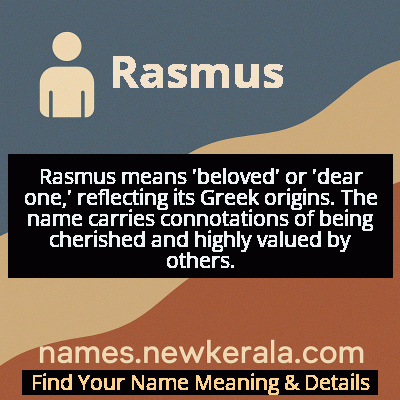Rasmus Name Meaning & Details
Origin, Popularity, Numerology Analysis & Name Meaning of Rasmus
Discover the origin, meaning, and cultural significance of the name RASMUS. Delve into its historical roots and explore the lasting impact it has had on communities and traditions.
Name
Rasmus
Gender
Male
Origin
Greek
Lucky Number
1
Meaning of the Name - Rasmus
Rasmus means 'beloved' or 'dear one,' reflecting its Greek origins. The name carries connotations of being cherished and highly valued by others.
Rasmus - Complete Numerology Analysis
Your Numerology Number
Based on Pythagorean Numerology System
Ruling Planet
Sun
Positive Nature
Leaders, ambitious, highly driven, self-reliant, innovative.
Negative Traits
Overly aggressive, domineering, impatient, selfish.
Lucky Colours
Red, orange, gold.
Lucky Days
Sunday.
Lucky Stones
Ruby, garnet.
Harmony Numbers
2, 3, 9.
Best Suited Professions
Entrepreneurs, managers, engineers.
What People Like About You
Courage, determination, leadership.
Famous People Named Rasmus
Rasmus Lerdorf
Computer Programmer
Created the PHP programming language
Rasmus Rask
Linguist
Pioneering work in comparative linguistics and Scandinavian languages
Rasmus Seebach
Singer-Songwriter
Multi-platinum Danish pop artist with numerous awards
Rasmus Bengtsson
Footballer
Professional Swedish defender playing in top European leagues
Name Variations & International Equivalents
Click on blue names to explore their detailed meanings. Gray names with will be available soon.
Cultural & Historical Significance
In Denmark, Sweden, and Norway, Rasmus developed a distinct cultural identity separate from its classical roots, representing a blend of traditional values with modern Scandinavian sensibility. The name's journey from ancient Greek to contemporary Nordic usage illustrates how names can transform across cultures while maintaining their core meaning of being cherished or beloved. During the Renaissance, the name Erasmus gained intellectual prestige through figures like Erasmus of Rotterdam, which eventually filtered down to the more accessible Rasmus in Northern Europe, where it became associated with both learnedness and approachability.
Extended Personality Analysis
Individuals named Rasmus are typically perceived as amiable, approachable, and genuinely warm-hearted. They often possess a natural charm that makes others feel comfortable in their presence, combined with a thoughtful demeanor that suggests depth beyond initial impressions. Their amiable nature doesn't mean they lack determination; rather, they approach challenges with a balanced perspective and quiet resilience. Rasmus individuals tend to be excellent communicators who value meaningful relationships, often serving as peacemakers in social or professional settings.
They typically exhibit a curious intellect and creative problem-solving abilities, making them valuable team members who can bridge different perspectives. While generally easygoing, they maintain strong personal values and can be surprisingly steadfast when principles are at stake. Their combination of social grace and inner strength makes them both likable and respected in their communities. The name suggests someone who balances emotional intelligence with practical wisdom, creating individuals who are both personally engaging and professionally competent.
Modern Usage & Popularity
In contemporary times, Rasmus remains predominantly popular in Scandinavian countries, particularly Denmark and Sweden, where it consistently ranks among the top 100 male names. The name has experienced a resurgence in popularity since the 1990s, partly influenced by cultural figures like musician Rasmus Seebach and the band The Rasmus. Outside Nordic regions, the name maintains a distinctive European charm while being relatively uncommon in English-speaking countries, giving it an exotic yet accessible quality. Modern parents often choose Rasmus for its combination of traditional roots and contemporary sound, appreciating its international recognizability without being overly common. The name's usage patterns show it appeals to educated, cosmopolitan families who value both cultural heritage and global connectivity.
Symbolic & Spiritual Meanings
Symbolically, Rasmus represents the enduring human qualities of affection, connection, and being cherished. The name carries connotations of warmth and approachability, symbolizing someone who bridges distances between people and ideas. Like its meaning 'beloved,' it suggests an individual who naturally attracts affection and respect through genuine character rather than forced charm. In a metaphorical sense, Rasmus embodies the Scandinavian ideal of 'hygge' - creating cozy, meaningful connections and comfortable social environments. The name also symbolizes intellectual curiosity and adaptability, reflecting its journey from ancient Greek origins to modern Nordic popularity. It represents the balance between tradition and progress, between deep roots and forward movement, making it symbolic of individuals who honor the past while embracing the future.

